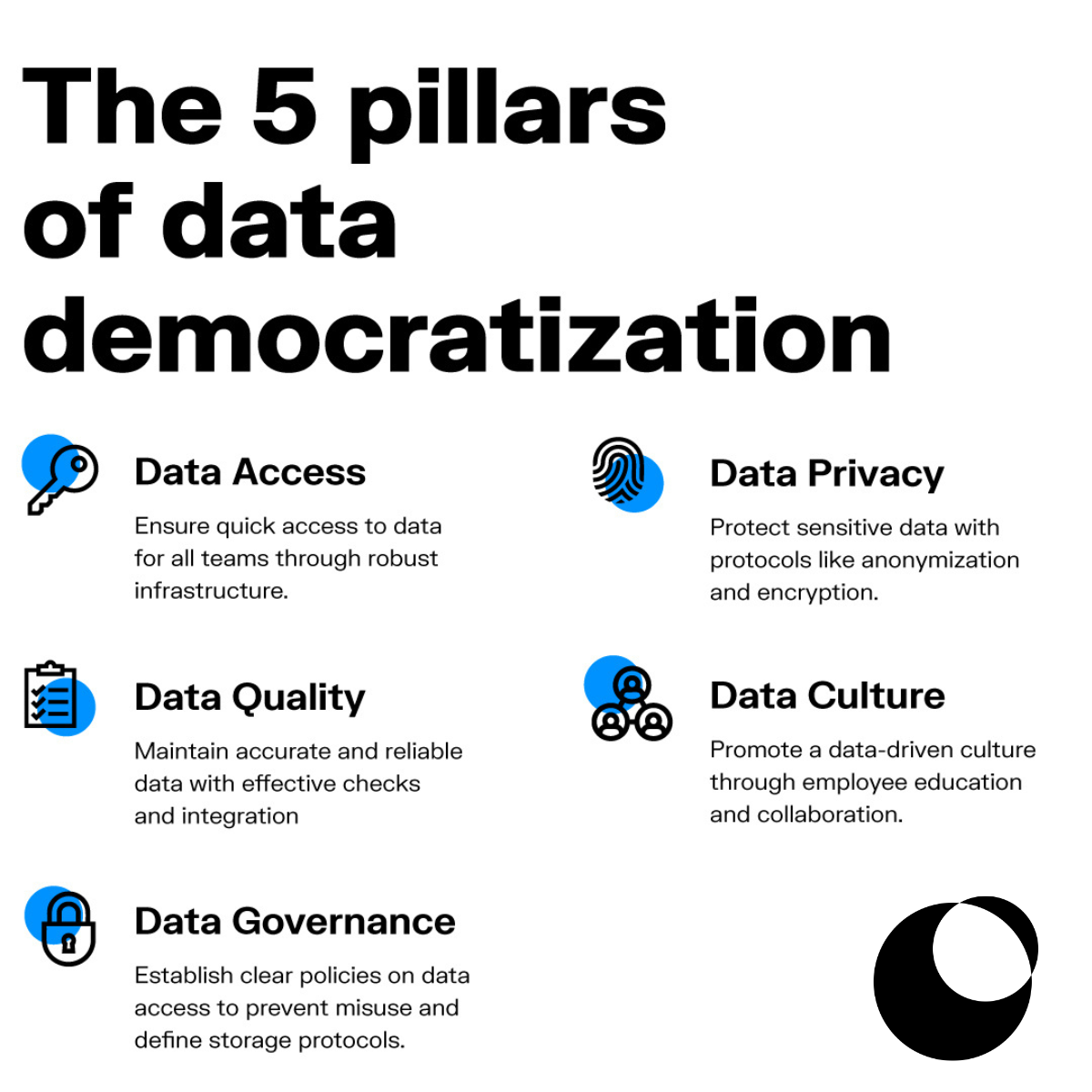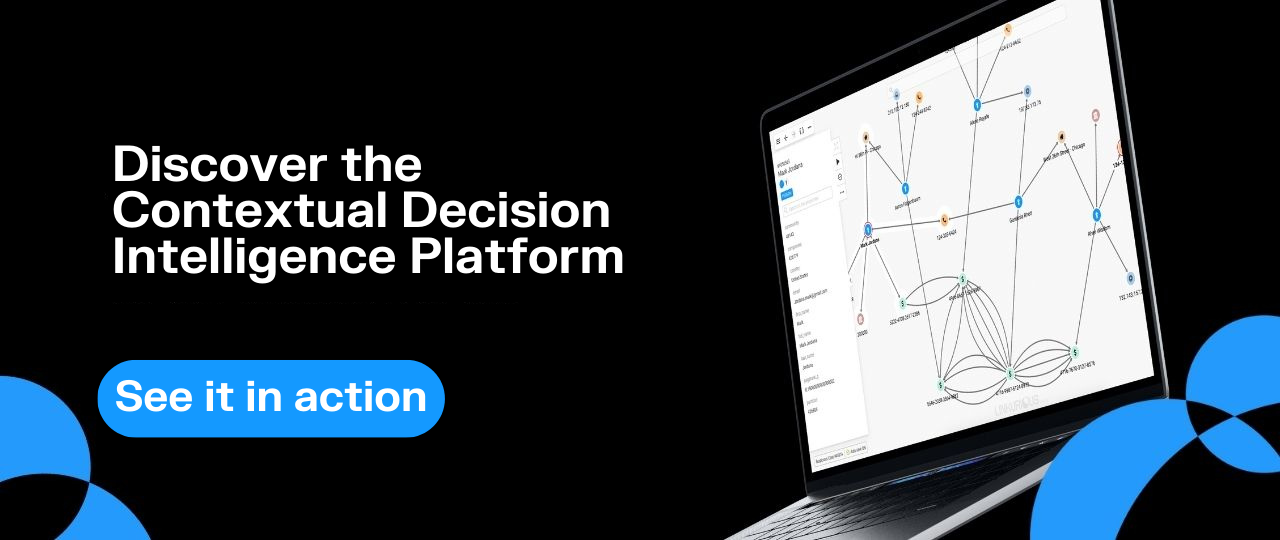Organizations are tapping into vast amounts of data like never before. It has become the raw material of decision making and business operations. In this context, connecting data and breaking down silos is crucial to unlocking real value. It's no longer just about gathering big data—it’s about turning it into actionable insights that drive informed decision-making. This is where data democratization comes in: the concept of making data accessible to everyone—not just data experts.
However, a gap remains between data teams and business leaders, as organizations often struggle to fully grasp what’s possible, while data professionals may not always understand the key business questions. This article explores the importance of data democratization and how technology can bridge this divide, enabling organizations to unlock the full potential of their data.
Data democratization is the process of making data accessible to everyone within an organization, regardless of their technical skills or background. It involves breaking down institutional barriers that restrict data access and analysis, empowering people all across an organization to make data-driven decisions. However, true data democratization goes beyond simply providing access to data—it involves ensuring that people have the tools, resources, and skills to understand, interpret, and act on that data. It also often involves cultural change.
In most organizations, data has traditionally been controlled by technical experts, creating bottlenecks in decision-making processes. Data democratization addresses these challenges by making data easy to access and use for non-technical teams.
Data democratization is important because it leads to improved operations, enhanced accountability, and the ability for all team members—regardless of their role—to leverage data for informed decision-making. In practical terms, data democratization solves common data challenges, such as:
- Lack of access to the data needed for decision-making
- Difficulty in trusting or understanding available data
- Inability to use analytics tools due to a lack of technical expertise
- Overworked data specialists who don’t have time to support each team’s needs
The sheer volume of data generated by organizations poses challenges in maintaining accessibility, reliability, and transparency. Effectively balancing these elements is crucial for fostering accountability and driving innovation.

In a business context, data democratization means non-technical teams will be able to make data-informed decisions without relying on data specialists. Traditionally, companies have depended on centralized IT teams for reports, but this model doesn’t scale and can hinder business performance. According to Gartner, improving data and analytics maturity can boost financial performance by 30%.
However, it’s crucial to be data-driven with purpose. Just collecting data isn't enough. Gartner research shows that 65% of organizations still use data selectively to justify pre-made decisions. To move beyond this, organizations need to shift to a decision-centric approach, where data not only informs but actively drives decisions across the organization. Data democratization has a key role to play in making this happen.
A key part of data democratization is implementing self-service tools that allow employees to work with data directly. Whether it’s a fraud analyst investigating suspicious transactions or a supply chain manager analyzing distribution patterns, accessible data enables them to deliver business value without constantly waiting for specialists.
There is no one-size-fits-all formula for data democratization. But there are certain key pillars to making data more widely accessible and actionable within an organization.
- Cultural shift: Managers need to overcome the fear that non-technical employees will misuse data. The goal is to equip all employees to become responsible data users who can apply data to drive real business value.
- Breaking down data silos: Data silos pose a significant barrier to democratization. Integrating data from multiple departments, data sources, etc. into a single, accessible system ensures consistency and makes it easier for employees to collaborate across functions.
- The right tools: Organizations need to invest in intuitive self-service environments. A strong user experience (UX) is critical in enabling employees to generate reports, access dashboards, and run analysis without relying on data specialists.
- Strong governance: While democratization aims to make data more accessible, it still requires robust data governance to ensure quality and security.
- Support: Partnering with external experts can provide the necessary support, reducing the burden on internal teams and ensuring a smooth implementation process.
However, simply making data available is not enough. The full potential of accessible data can only be realized if people have the skills to understand and use it effectively, underscoring the importance of data literacy.
At the heart of data democratization is data literacy—the ability for people to understand, interpret, and work with data in a meaningful way. Data literacy goes beyond simply knowing how to read charts or operate tools; it’s about cultivating the skills to ask the right questions, draw insights, and make informed decisions based on data.
For organizations aiming to democratize their data, improving data literacy across teams is essential because democratization without education can lead to misinterpretation or even incorrect conclusions. Providing access to data is only the first step, the true value comes when people know how to use that data effectively. For instance, if employees are given vast amounts of data but lack the skills to analyze or interpret it, they may either ignore the data or make flawed decisions.
To help employees unfamiliar with data, organizations should provide support and equip them with user-friendly technology. Tools like advanced analytics platforms, intuitive dashboards, and AI-driven systems can simplify data analysis, offering actionable insights. With the right resources, even non-technical staff can confidently work with data to drive better decisions.
Linkurious, the graph data exploration and investigation platform, was founded on the idea of democratizing data. The long-term vision of the founders of Linkurious has been to make data exploration and analysis available to everyone—not just data scientists.
For over a decade, Linkurious has been empowering both technical and non-technical users to make sense of their connected data. By providing organizations with user-friendly technology, Linkurious enables all users—regardless of their technical expertise—to explore and leverage data in their decision-making processes. With a strong emphasis on intuitive design and seamless integration, Linkurious helps businesses break down silos, foster collaboration, and unlock the full potential of their data.
A spotlight on graph technology directly in your inbox.


